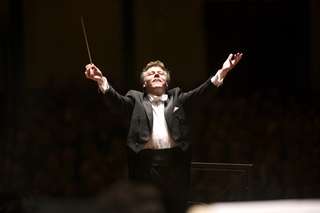|
Back
Happy Families New York
Stern Auditorium, Carnegie Hall
04/19/2016 - & April 9 (Frankfurt am Main), 16 (Ann Arbor) 2016
John Corigliano: Fantasia on an Ostinato
Erich Wolfgang Korngold: Violin Concerto in D Major, Op. 35
Antonín Dvorák: Symphony No. 8 in G Major, Op. 88
Leonidas Kavakos (violin)
Bavarian Radio Symphony Orchestra, Mariss Jansons (conductor)

M. Jansons (© Marco Borggreve)
“Melodies simply pour out of me.”
Dvorák, on the composition of his 8th Symphony
New York critics have had John Corigliano to kick around for a long time. He was concertmaster of the local philharmonic from 1943 to 1966 and therefore a major sonic force on those great Bernstein recordings. His son of the same name is a rather prolific composer of somewhat popular-influenced ersatz classical pieces, most notably the score to The Red Violin.
Erich Wolfgang Korngold also had a famous father, the tremendously influential critic Julius Korngold. “Little Korngold”, as the son was nicknamed in Viennese circles, composed a number of mature and satisfying efforts, both operatic and orchestral, before emigrating to Los Angeles along with Schoenberg, Stravinsky and Mann, to become a highly influential fashioner of film scores. The slur against the music of Gustav Mahler in 1950’s America, that it sounded like “movie music”, is largely based on the direction that Hollywood took in the Korngold era. A third generation was represented by Erich’s son George, the music editor of such television icons as the “Daniel Boone” and “Leave It to Beaver” programs.
Antonín Dvorák headed an even larger musical family. His son-in-law was the Czech composer and violinist Josef Suk, whose Asrael Symphony is shamefully ignored today. Dvorák’s great-grandson, also named Josef Suk, is a masterful violinist. When New York unveiled its Dvorák statue downtown, a string quartet led by Suk was on hand to play for dignitaries and music lovers alike.
Mariss Jansons is the son of Latvian conductor Arvīds Jansons and is probably best known to New Yorkers as the man who lost out to Lorin Maazel in the final competition to become conductor of the New York Philharmonic when he worked them hard in rehearsal while Maazel let them go home rather than practice the Bruckner 8th Symphony.
Around the turn of this century longtime critic Jay Nordlinger and I came up with a new word that defined what had become a virtual requirement for every orchestral concert. Our term was the “oomp” or obligatory opening modern piece. Virtually no concert could begin without an oomp. Thankfully this phenomenon has almost run its course, but this evening began with just such an effort. The Corigliano work fit all of the requirements: short, harmless and eminently forgettable, the sort of rumination that your composition teacher at university employed as an example of “originality”.
The Korngold Cello Concerto is an integral part of the fine film Deception, starring Bette Davis. In fact, the entire concerto is, in a very real sense, the main character of the movie. Conversely, the first movement theme of the Violin Concerto is employed in a rather terrible flop called Another Dawn, the less said of which the better. However Korngold fleshes out a beautiful melodic essay that is a specialty of violinist Kavakos and has also been recently presented here in New York by Hilary Hahn.
This current performance was sensitive and sensual, the rich accompaniment mostly supportive of the soaring of the soloist, although there were several points in the final Allegro assai vivace where the Bavarians simply overwhelmed the fiddler, leaving him ardently sawing away although essentially silent to our ears. Most notable was the Andante, a delightful kaleidoscope of the seductive, and the opening section of the last movement which sounded quite a bit like the film music side of Aaron Copland. Mr. Kavakos has clearly made this piece his own. Long may he cherish it.
Although, at least on this side of the Atlantic, the “New World” is by far the most familiar symphony of Dvorák, a strong case can be made that the most tuneful is the G Major Eighth. That case would be highly strengthened by this performance at Carnegie Hall. The ensemble was strong and lovely by turns, cherishing each passage with their warm strings. The waltz-like Allegretto grazioso was superb and the contrasting solo trumpet call that begins the final movement was significantly clarion. There is still a month to go in the season, but my pick for best performance of the year is already hereby submitted.
Fred Kirshnit
|